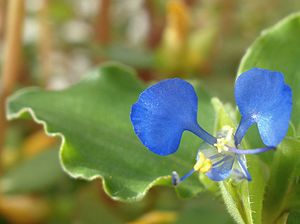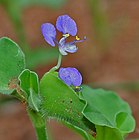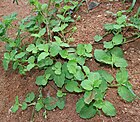Note: This is a project under development. The articles on this wiki are just being initiated and broadly incomplete. You can Help creating new pages.
Difference between revisions of "Commelina benghalensis"
(→Flower) |
(→Uses) |
||
| Line 2: | Line 2: | ||
'''Commelina benghalensis''' is a herbaceous perennial plant. The plant can become annual in areas with colder winters or long dry seasons. | '''Commelina benghalensis''' is a herbaceous perennial plant. The plant can become annual in areas with colder winters or long dry seasons. | ||
==Uses== | ==Uses== | ||
| − | {{Uses|Eye ailments}}, {{Uses|Sore throat}}, {{Uses|Burns}}, {{Uses|Sorefeet}}, {{Uses|Diarrhoea}} | + | {{Uses|Eye ailments}}, {{Uses|Sore throat}}, {{Uses|Burns}}, {{Uses|Sorefeet}}, {{Uses|Diarrhoea}}, {{Uses|Constipation}}, {{Uses|Increase the sperm count}}<ref name="Uses"/> |
==Parts Used== | ==Parts Used== | ||
Revision as of 10:45, 9 October 2021
Commelina benghalensis is a herbaceous perennial plant. The plant can become annual in areas with colder winters or long dry seasons.
Contents
- 1 Uses
- 2 Parts Used
- 3 Chemical Composition
- 4 Common names
- 5 Properties
- 6 Habit
- 7 Identification
- 8 List of Ayurvedic medicine in which the herb is used
- 9 Where to get the saplings
- 10 Mode of Propagation
- 11 How to plant/cultivate
- 12 Commonly seen growing in areas
- 13 Photo Gallery
- 14 References
- 15 External Links
Uses
Eye ailments, Sore throat, Burns, Sorefeet, Diarrhoea, Constipation, Increase the sperm count[1]
Parts Used
Chemical Composition
Common names
| Language | Common name |
|---|---|
| Kannada | ಗುಬ್ಬಚ್ಚಿ ಬಾಳೆ Gubbachchi bale, ಗುಬ್ಬಚ್ಚಿ ಬಸಳೆ Gubbachchi basale |
| Hindi | Jalbhu, Kanakaua |
| Malayalam | Kanavazhai, Vuzhaipadathi |
| Tamil | Kan-an-kolai, Kanavalai |
| Telugu | Amruta kaada, Neerukaassuvu |
| Marathi | Kanchat, Kena |
| Gujarathi | Motun shishmuliyun |
| Punjabi | NA |
| Kashmiri | NA |
| Sanskrit | Kanchata |
| English | Bengal dayflower, Fire leaf |
Properties
Reference: Dravya - Substance, Rasa - Taste, Guna - Qualities, Veerya - Potency, Vipaka - Post-digesion effect, Karma - Pharmacological activity, Prabhava - Therepeutics.
Dravya
Rasa
Guna
Veerya
Vipaka
Karma
Prabhava
Habit
Identification
Leaf
| Kind | Shape | Feature |
|---|---|---|
Flower
| Type | Size | Color and composition | Stamen | More information |
|---|---|---|---|---|
| Flowering from June to December |
Fruit
| Type | Size | Mass | Appearance | Seeds | More information |
|---|---|---|---|---|---|
| Fruiting from June to December |
Other features
List of Ayurvedic medicine in which the herb is used
Where to get the saplings
Mode of Propagation
Stem cuttings, Root cuttings, Seeds.
How to plant/cultivate
A plant of warm temperate to tropical areas where it can be found at elevations up to 1,600 metres.[5]
Commonly seen growing in areas
Common in disturbed areas, At forest edges, Home gardens, Secondary regrowth.
Photo Gallery
References
- ↑ Cite error: Invalid
<ref>tag; no text was provided for refs namedUses - ↑ [Chemistry]
- ↑ Common names
- ↑ [Morphology]
- ↑ Cultivation
External Links
- Pages with reference errors
- Ayurvedic Herbs known to be helpful to treat Eye ailments
- Ayurvedic Herbs known to be helpful to treat Sore throat
- Ayurvedic Herbs known to be helpful to treat Burns
- Ayurvedic Herbs known to be helpful to treat Sorefeet
- Ayurvedic Herbs known to be helpful to treat Diarrhoea
- Ayurvedic Herbs known to be helpful to treat Constipation
- Ayurvedic Herbs known to be helpful to treat Increase the sperm count
- Herbs with Leaves used in medicine
- Herbs with common name in Kannada
- Herbs with common name in Hindi
- Herbs with common name in Malayalam
- Herbs with common name in Tamil
- Herbs with common name in Telugu
- Herbs with common name in Marathi
- Herbs with common name in Gujarathi
- Herbs with common name in Sanskrit
- Herbs with common name in English
- Habit - Perennial
- Index of Plants which can be propagated by Stem cuttings
- Index of Plants which can be propagated by Root cuttings
- Index of Plants which can be propagated by Seeds
- Herbs that are commonly seen in the region of Common in disturbed areas
- Herbs that are commonly seen in the region of At forest edges
- Herbs that are commonly seen in the region of Home gardens
- Herbs that are commonly seen in the region of Secondary regrowth
- Herbs
- Pages without herbs images







